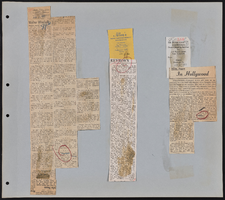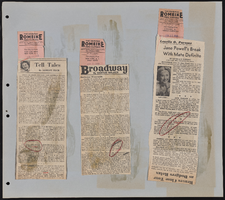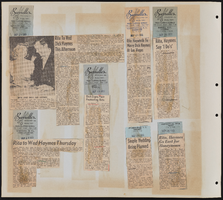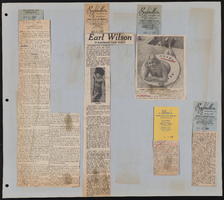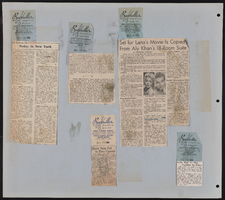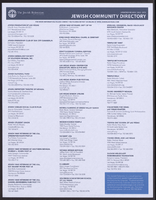Search the Special Collections and Archives Portal
Search Results
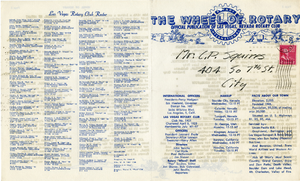
The Wheel of Rotary Las Vegas Rotary Club newsletter, December 8, 1949
Date
1949-12-08
Archival Collection
Description
Newsletter issued by the Las Vegas Rotary Club
Text
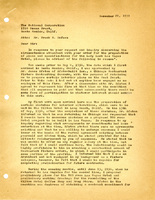
Letter from Homer Rissman to Frank S. Hofues, Santa Monica, December 21, 1955
Date
1955-12-21
Archival Collection
Description
Five-page letter from Homer Rissman to Frank Hofues regarding the Lady Luck Casino, later named the Hacienda.
Text
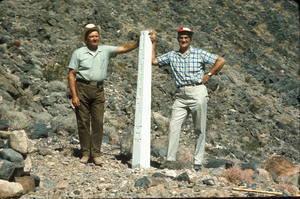
Slide of John Lytle at Emigrant (Fremont) Gap on the Old Spanish Trail, California, circa 1960s
Date
1960 to 1969
Archival Collection
Description
John Lytle (left) and Sherman "Scoop" Garside (right) at Emigrant (Fremont) Gap on the Old Spanish Trail. Emigrant Gap is a gap in a ridge on the California Trail as it crosses the Sierra Nevada, to the west of what is now known as Donner Pass. Here the cliffs are so steep that, back in the 1840s, the pioneers on their way to California had to lower their wagons on ropes in order to continue. The first official effort to mark the Old Spanish Trail across Nevada took place in 1964 when the Governor of Nevada asked Sherwin "Scoop" Garside to design and implement a Centennial project to help commemorate the Silver State's 100th birthday. Garside proposed that an appropriate Centennial project would be to mark the trace of the Old Spanish Trail across southern Nevada. The Governor concurred and directed the Nevada State government to cooperate in the project. Garside and his associate John Lytle brought together a group of friends and supporters to help fund and fabricate the white concrete posts that were used to mark the trace of the Old Spanish Trail across the state. Members of an affiliate of the local Boy Scouts of America Council helped erect thirty-three of these markers across the Mojave Desert in southern Nevada and Eastern California. The markers are inscribed with the legend "The Old Spanish Trail, 1829-1855." There are four Old Spanish Trail Historical Markers located in Nevada. One is located on U. S. 91 in Mesquite, the second is located in Fantasy Park, 1/4 mile east of Las Vegas Boulevard, North and Washington Avenue in Las Vegas, the third is located at Town Center in Blue Diamond, and the fourth is located on State 16 at Mountain Springs Summit. In 2001, the section of the Trail that runs across Nevada from the Arizona border to California (known as the "Old Spanish Trail-Mormon Road Historic District") was placed on the National Register of Historic Places.
Image
Pagination
Refine my results
Content Type
Creator or Contributor
Subject
Archival Collection
Digital Project
Resource Type
Year
Material Type
Place
Language
Records Classification

